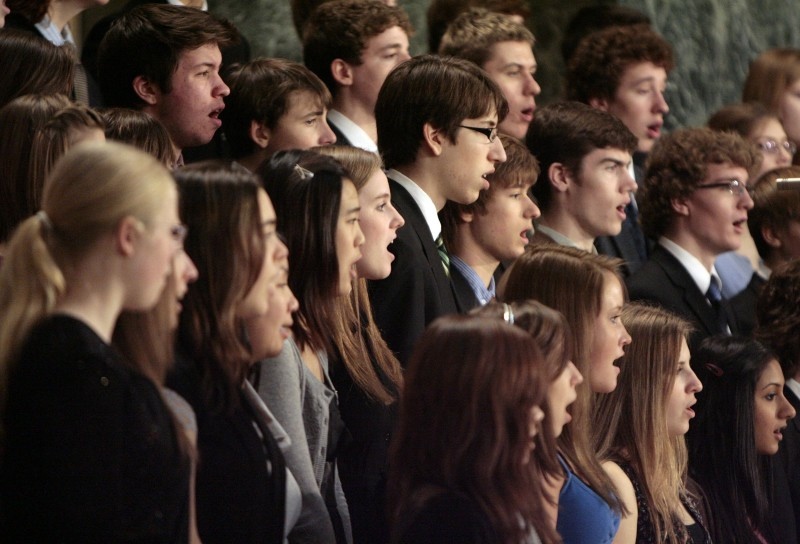How can we continue to shape and sustain the world of choral music and education for future generations?
Here are 6 great quotes on the future of choral music from experts in the field.
Combating Budget Cuts In Music Education
“We need to connect the arts to all of those other aspects of learning that students are so pressed to excel at. When we do Holst’s “The Planets,” let’s talk about astronomy. Let’s figure out some way to get scientists in the same room with us. If you’re going to sing “Dona Nobis Pacem,” get an expert who does poetry and art about war to come in. We should connect more. It’s hard because we are all so specialized and focused on our own thing. But we can’t lose the opportunity to help people work on the spiritual, social, and soulful parts of their lives”. –Ann Howard Jones, director of choral activities at Boston University
Advancements in Tech and Its Place in the Choral Field
“All the research we are paying attention to shows that media consumption of classical music in general, including choral music, is going online. It used to be if you wanted to listen to choral music, you made it yourself or turned on the radio or listened to a record. But now you can go to YouTube and listen to fabulous little videos of choirs from all over the world. So the competition for visibility has become dramatically sharper in the last two or three years.”
The phrase we use here a lot is mindshare. With everyone having almost limitless choices, we are competing for mindshare. In April 2012 we opened up Choral Stream on MPR, a 24-hour choral channel with 30 hours of choral music playing in one continuous loop. I had hoped for about 20,000 monthly launches of that stream after a year, but we had three times that. We think there is a significant national online audience for this”. — Brian Newhouse, managing director of Minnesota Public Radio/American Public Media’s classical programming
Programming and Music Selection Shifts and Trends
“As I tell my instrumental colleagues, we have a little bit of an advantage in that choral music crosses so many genres. The choir has the ability to go in and out of the classical, popular, and sacred music worlds. People are thinking outside of the box to make this a relevant art form. This can sometimes be tough because we as conductors may feel pressure to play into pop culture’s ideas of what music is. Because we have so much at our disposal, it is a challenge to not lose sight of the past, the greats, the chestnuts, the strong traditions that have built choral music to be what it is today”. —Eugene Rogers, associate director of choirs at the University of Michigan
Developing the next generation of Choral Composers
“Take advantage of the writers out there. Commission them and ask them to write texts. My main writer is Nilo Cruz, who won a Pulitzer Prize as a playwright. He really understands theater and performance and understands how words need to live on the stage. It is not a great leap when you have a writer like that, who is living, to make the transition to music. That is a guaranteed way of having a contemporary voice instead of programming the same repertoire all the time. That is a good way to secure our relevance in the general public’s eyes”. –Gabriela Lena Frank, composer and musician
Thoughts On Insuring The Future Success Of Choruses
“The concert hall itself is changing. It is no longer the place you go in and sit and listen. The concert hall is a coffee shop or a museum. Choruses have the opportunity to create ambiance, to become the art installations of the future. That is what will create a new art form”. –Gabriela Lena Frank, composer and musician
Elevating The Awareness and Appreciation of Choral Music
“The job of the professional chorus is not the short game; it is the long game. It is every time people come they will be amazed, they will be entranced, and they will come back and most likely they will bring someone. It’s like the way a redwood grows. It is slow but it is constant. So many of the professional choruses in the U.S. are very new, under five years old. It is important to realize that what people are trying to accomplish is not going to happen in the next program. It will happen in the next decade.
With choruses, our real job is to convince people that our programming and our commitment to quality is so high, that even if I don’t know the pieces, the performance will be at the level that I would expect of any professional organization. We are required to give absolutely excellent performances every time. We can never afford to let down our audience in the contract we make with them when they buy the ticket. If we constantly stand by that contract, we will win.” –Patrick Dupré Quigley, founder and artistic director of Miami’s Seraphic Fire and the Firebird Chamber Orchestra

